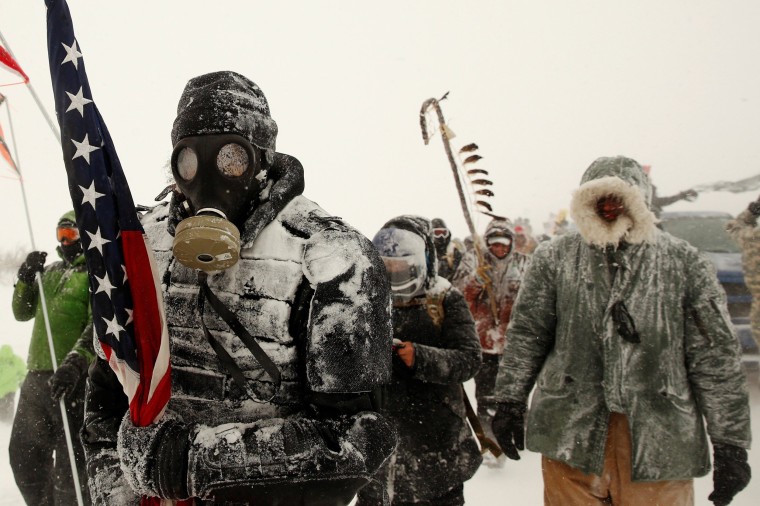A major oil spill just 150 miles from the Dakota Access Pipeline protests in North Dakota has validated the concerns of those who spoke out against the project for months, activists said.
State officials estimate that more than 176,000 gallons of crude oil has leaked from the Belle Fourche Pipeline over the past week into the Ash Coulee Creek in western North Dakota. A landowner discovered the spill near the town of Belfield on Dec. 5, according to Bill Suess, an environmental scientist with the North Dakota Health Department.
Related: Pipeline Spills 176,000 Gallons of Oil Into Creek 150 Miles From Dakota Access Protests
The leak was contained within hours of its discovery, Wendy Owen, a spokeswoman for Casper, Wyoming-based True Cos., which operates the Belle Fourche pipeline, told CNBC.
But when news of the spill reached the Oceti Sakowin Camp — where thousands have protested the controversial Dakota Access Pipeline for months — activists said they felt vindicated.
One of the protesters' central arguments for months has been that, despite assurances from Energy Transfer Partners — the Dallas-based company funding the $3.7 billion project — an oil spill would be inevitable.
And the Standing Rock Sioux Tribe believes that a spill would devastate the Missouri River, which is the main water source for the tribe.
For Tara Houska, a Native American environmental activist who has resided at the camp since August, the oil spill was "yet another example of what happens when you have lax regulations written by oil companies and their patrons."
Related: Dakota Access Pipeline: What's Behind the Protests?
"The spill gives further credence to our position that pipelines are not safe," said Houska, National Campaigns Director for Honor the Earth, a nonprofit organization focused on raising awareness and financial support for indigenous environmental justice. "Oil companies' interest is on their profit margins, not public safety."
In an interview last month, Energy Transfer Partners CEO Kelcy Warren told NBC News that he could not assure the tribe that an oil spill could not potentially occur. Warren would only say that the Dakota Access Pipeline was prepared to withstand such an event.
Warren said the pipeline would cross 90-115 feet below Lake Oahe, a large Missouri River reservoir, with double walled and remote-controlled shutoff valves on each side of the crossing.
A spokesperson for Energy Transfer Partners declined to comment for this article.
Related: What's Next for the Dakota Access Pipeline? Some Protesters Wary of Future
"They can say they have all the latest technologies to safeguard against a leak," Standing Rock Sioux Chairman Dave Archambault II told NBC News. "But when that leak happens, and it will, all those safeguards will go out the window."
Archambault said he relayed his concerns to North Dakota Gov. Jack Dalrymple on Monday night, their first one-on-one meeting since the protests began last summer.
Dallas Goldtooth, a member of the Dakota Nation who has been at the camp off-and-on since August, told NBC News that the pipeline spill upstream "shows everyone the necessity to examine not only the Dakota Access Pipeline but all fossil-fuel energy infrastructure development."
“This should spur us to act," said Goldtooth. "This should encourage everyone who believes in protecting Mother Earth that we need to examine and critique every fossil fuel project that’s being put on the table.”
Allison Renville, an activist from the Lakota nation, was less circumspect. "We're winning," she told NBC News.
"The spill at Bel Fourche, again, is proof that we're right," said Renville. "It validates our struggle."
The Army earlier this month denied ETP the easement needed to continue their path under Lake Oahe, but many activists fear that the decision could be reversed when President-elect Donald Trump enters the White House.

